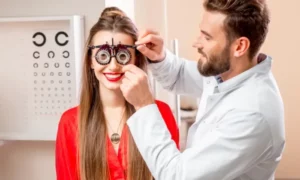Are you tired of the daily struggle with glasses or the hassle of contact lenses? Do you yearn for clear vision and the freedom it brings? If so, you’re not alone. But what if we told you there’s a solution that can liberate you from this vision-related agony? LASIK surgery—the modern miracle that has transformed countless lives, providing crystal-clear vision without the constant reliance on glasses or lenses. And if you’ve ever wondered about the age limit for LASIK surgery, you’re in the right place. We’re here to unravel the mysteries, address your questions, and guide you through the age factors involved in this life-changing procedure.
Let’s dive in and discover how LASIK can become the key to a world where sharp, clear vision knows no age limits.
Contents
Is There Any Age Limit for LASIK Surgery: Exploring the Basics
You might be thinking about LASIK surgery to get rid of glasses and contact lenses. But you might have a question on your mind, “Is there an age limit for this transformative procedure?” Understanding the age-related criteria is crucial, as it plays a significant role in your LASIK journey.
- The Minimum Age Requirement
If you’re a teenager or a parent considering LASIK for your child, there’s a crucial piece of information to keep in mind. LASIK is generally not performed on individuals under the age of 18. Why? It’s because your eyes continue to undergo changes during your teenage years. To ensure that your vision has stabilized, it’s best to wait until you’re at least 18 years old. - The Ideal Age Range
While there isn’t a maximum age limit for LASIK, there is an ideal age range during which many individuals opt for this procedure. Typically, individuals between the ages of 20 and 40 are prime candidates for LASIK. Why? This age group is more likely to experience stable vision, making the results of LASIK surgery more predictable and consistent. If you fall within this range, you’re in the sweet spot for LASIK eligibility. - Beyond 40: Presbyopia and Other Considerations
If you’re in your 40s or beyond, you may be wondering if LASIK is still an option. While there’s no strict upper age limit for LASIK, there are some factors to consider. At around the age of 40, many individuals begin to experience presbyopia, a natural age-related change that affects near vision. LASIK can still correct distance vision effectively, but you may require reading glasses for up-close tasks. Your ophthalmologist can guide you through the best options based on your specific needs.
The Younger Side: LASIK for Teens and Young Adults
Achieving clear vision without the hassle of glasses or contact lenses is not limited by age. In fact, some teenagers and young adults are eager to explore LASIK as an option for vision correction. Let’s delve into the considerations and factors involved when performing LASIK on individuals under the age of 18 who may be interested in this life-changing procedure.
- For individuals under the age of 18, there’s a fundamental criterion that must be met before LASIK can be considered: vision stability. To ensure the success of LASIK surgery, your ophthalmologist will want to see that your prescription has remained relatively stable for at least one year.
- LASIK is a surgical procedure, and like any surgery, it requires informed consent. Teenagers interested in LASIK must be emotionally mature and capable of understanding the risks, benefits, and potential outcomes. This means that they, along with their parents or guardians, should actively participate in the decision-making process.
- While LASIK may be a fantastic option for many people, it might not be the best choice for everyone, especially those under 18. In some cases, alternative vision correction methods, like contact lenses or glasses, may be more suitable.
- The eyes of younger individuals can continue to change well into their late teens. So, even if LASIK is performed successfully, there’s a possibility of needing enhancements or touch-ups to maintain the clarity of your vision over time.
LASIK for teenagers and young adults can be a life-changing experience, offering newfound freedom from vision aids. But it’s essential to approach this journey with careful consideration and guidance from a knowledgeable eye care professional.
Ideal Age Range: Who Benefits Most from LASIK
LASIK surgery is a transformative vision correction procedure that offers the prospect of clear vision without the need for glasses or contact lenses. However, it’s often recommended for individuals within a specific age range to maximize the potential for long-lasting results. Let’s break down why age matters when considering LASIK:
- Vision Stability
For LASIK to be most effective, it’s crucial that your vision has stabilized. This means your eyeglass or contact lens prescription hasn’t changed significantly over the past year. Stability ensures that your eyes have reached a consistent refractive state. - The Age of Stability
Most eye care professionals prefer that patients are at least 18 years old before considering LASIK. At this age, it’s more likely that your vision has stabilized, making the results of the procedure more predictable. - Effective and Long-Lasting Results
LASIK’s effectiveness is closely tied to the age of the patient. For those in their 20s or 30s, LASIK can offer long-lasting results that significantly reduce or eliminate the need for glasses or contact lenses. This can enhance your quality of life and reduce the ongoing expenses associated with vision correction. - Consideration for Older Adults
While LASIK is highly effective for younger patients, older adults can still undergo the procedure successfully. Eye care professionals will consider the health of your eyes and overall medical condition in addition to your age when determining LASIK candidacy.
LASIK is a transformative choice for achieving clear vision, but the timing can be a crucial factor. The ideal age range for LASIK is generally between 20 and 40, but individuals of various ages can benefit from this life-changing procedure.
Beyond 40: Presbyopia and LASIK

As we age, our eyes undergo natural changes, and one common vision concern that tends to surface around age 40 is presbyopia. This age-related condition affects the eye’s ability to focus on close objects and often results in the need for reading glasses or bifocals. But where does LASIK fit into the picture for individuals over 40 experiencing presbyopia?
Presbyopia and LASIK: A Unique Challenge
- Presbyopia can complicate LASIK surgery. The procedure primarily corrects refractive errors like myopia (nearsightedness), hyperopia (farsightedness), and astigmatism by reshaping the cornea. Presbyopia, on the other hand, stems from the gradual loss of flexibility in the eye’s natural lens, making it difficult to focus on nearby objects.
Monovision LASIK
- A common approach for addressing presbyopia with LASIK is called “monovision.” In monovision LASIK, one eye is optimized for distance vision, while the other eye is set for near vision. This technique can reduce the need for reading glasses but may compromise depth perception.
Other Alternatives
- Beyond LASIK, various surgical and non-surgical alternatives are available to manage presbyopia. Procedures like multifocal IOL (intraocular lens) implantation can be used in cataract surgery to address both cataracts and presbyopia simultaneously. For those looking to avoid surgery, multifocal or progressive eyeglasses and multifocal contact lenses are non-invasive options to correct presbyopia.
While LASIK remains a viable option for many individuals over 40, presbyopia can present unique challenges that may require specific LASIK techniques or consideration of alternative vision correction methods. Your age should not discourage you from seeking the clear vision you desire, and the best approach can be determined through consultation with an eye care specialist.
Assessing Eye Health To Determine LASIK Suitability
 Determining whether LASIK is the right choice for your vision correction needs is a comprehensive process. Ophthalmologists assess a variety of factors, with age and overall eye health playing a pivotal role in the decision-making process.
Determining whether LASIK is the right choice for your vision correction needs is a comprehensive process. Ophthalmologists assess a variety of factors, with age and overall eye health playing a pivotal role in the decision-making process.
Eye Health Evaluation: Ophthalmologists conduct a thorough evaluation of your eye health before recommending LASIK. This evaluation includes:
- Corneal Health
The cornea, the clear front surface of the eye, is reshaped during LASIK. It must be thick enough and healthy for the procedure. - Tear Film Quality
Adequate tear production and a stable tear film are essential for comfortable healing after LASIK. - Refractive Stability
Your eye prescription should remain relatively unchanged for at least a year to be considered stable enough for LASIK. - General Eye Health
Other eye conditions, such as glaucoma or cataracts, need to be addressed before considering LASIK.
- Corneal Health
Beyond the Age Factor
- It’s important to understand that age is just one of many factors considered during the LASIK evaluation process. If you are outside the typical age range but still desire LASIK, your eye care professional will assess your individual situation to determine if the procedure is appropriate.
Ultimately, LASIK suitability is a case-by-case determination. Consultation with an experienced eye care specialist is the best way to find out if LASIK is right for you. They will assess your age, eye health, and other factors to help you make an informed decision about your vision correction journey.
Conclusion
Choosing to undergo LASIK surgery is a significant decision that can transform the way you see the world. Whether you’re a young adult seeking clear vision or someone beyond the age of 40 exploring your options, LASIK can be life-changing.
Remember, LASIK eligibility is not solely determined by your age. Your eye health, corneal thickness, tear film quality, and refractive stability are equally crucial factors in this decision. That’s why a consultation with a qualified eye care specialist is essential.
At EyeMantra, we understand that everyone’s eye health and vision needs are unique. Our experienced ophthalmologists are here to guide you through the process, ensuring you receive the personalized care you deserve.
If you’re looking to break free from glasses and contact lenses, we’re here to help. Experience the freedom of clear vision with LASIK Surgery at EyeMantra. Don’t wait any longer – book your free appointment now at 9711116605 and take the first step toward a brighter, glasses-free future.



